Navigation
 Home
Home
 WHO WE ARE
WHO WE ARE
 OUR DEMANDS
OUR DEMANDS
 OUR ACTIONS
OUR ACTIONS
 OUR MAIN FIELDS OF ACTION: The Common Good and Access to Resources, Peace and demilitarisation, Women's Work and Violence against Women
OUR MAIN FIELDS OF ACTION: The Common Good and Access to Resources, Peace and demilitarisation, Women's Work and Violence against Women
 Become a member
Become a member
 News
News
 Agenda
Agenda
 Structure: IC, Countries and Participating bodies, International meetings
Structure: IC, Countries and Participating bodies, International meetings
 Newsletters
Newsletters
 Publications
Publications
 2000 - Sexism and Globalization, 2000 Good Reasons to March
2000 - Sexism and Globalization, 2000 Good Reasons to March
 2003 World Social Forum
2003 World Social Forum
 A Change of Course, The Millenium Development Goals (MDGs) through the Lens of the Women's Global Charter for Humanity, August 2005
A Change of Course, The Millenium Development Goals (MDGs) through the Lens of the Women's Global Charter for Humanity, August 2005
 A Score for Women’s Voices
A Score for Women’s Voices
 Advocacy Guide to Women's World Demands, 2000
Advocacy Guide to Women's World Demands, 2000
 Appeal of the World March of Women for the Construction of a Just, Equal, Cooperative, Democratic and Peaceful World
Appeal of the World March of Women for the Construction of a Just, Equal, Cooperative, Democratic and Peaceful World
 Changing the World Step by Step, 2000
Changing the World Step by Step, 2000
 ECONOMICS IN QUESTION: A WOMEN’S PERSPECTIVE
ECONOMICS IN QUESTION: A WOMEN’S PERSPECTIVE
 G8 AND WOMEN: WORLDS APART
G8 AND WOMEN: WORLDS APART
 Information about demand V-6 concerning sex trafficking of women and girls
Information about demand V-6 concerning sex trafficking of women and girls
 Information Document on Lesbian Rights (1999)
Information Document on Lesbian Rights (1999)
 Letter to Kofi Annan, UN General Secretary, October 17, 2000
Letter to Kofi Annan, UN General Secretary, October 17, 2000
 Letter to the IMF and the World Bank, October 16, 2000
Letter to the IMF and the World Bank, October 16, 2000
 Supporting Document 1 to the Charter
Supporting Document 1 to the Charter
 Supporting Document 2 to the Charter
Supporting Document 2 to the Charter
 The World March of Women 1998-2008: A Decade of International Feminist Struggle
The World March of Women 1998-2008: A Decade of International Feminist Struggle
 The World March of Women 2010 - Third International Action
The World March of Women 2010 - Third International Action
 WMW at the Global Forum on Financing the Right to Sustainable and Equitable Development
WMW at the Global Forum on Financing the Right to Sustainable and Equitable Development
 Women on the March, 2002
Women on the March, 2002

|
April 2002 - Actions to Revolutionize the World
 |
|
Women's Marching Feet Echo around the World
GENEVA, SWITZERLAND
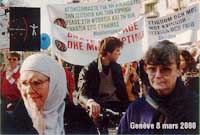
Above: Women demonstrate in Geneva. |
The launch of the World March of Women in Europe on March 8, 2000 was the occasion of a huge rally in the streets of Geneva, Switzerland. Women from all over Europe, both East and West, answered the call. After that, actions were staged in Albania, Cyprus, Denmark, France, the Netherlands, Portugal, Romania, Sweden, Turkey, and other countries.
|
Some 35,000 women gathered for a demonstration on October 14, 2000, in the European capital, two days before the world marches in Washington and New York. A delegation met with a European commissioner. Although that Sunday the streets around the European Commission were deserted, the demonstration had an effect on participating women's groups.
| BRUXELLES, BELGIAN
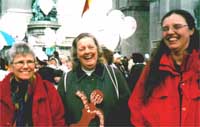
Above: Belgian demonstrators at the European March. |
SPAIN
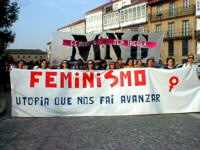
Above: "Feminism, a utopia that carries us forward" (Galicia). |
Spanish women all over the country were very active in the year 2000 and kept the mobilization going in 2001. After the September 11 attacks in the United States, they marched against war in Barcelona and in Galicia. "War and terror are always patriarchal tools that must be rejected by the feminist viewpoint," the women of Valencia affirmed and then staged a one-day hunger strike on December 1 to protest against discrimination between the sexes.
|
On October 17, from the United Nations, the Yugoslavian delegate on the March saluted "all those women of Serbia and Vojvodina who courageously conducted an electoral campaign based on women's rights in Yugoslavia" and those women who, "with undefeatable hope and commitment, fight repression and poverty." She protested against the impunity enjoyed by dictators and called for a legal system that implements the offending party's obligation to repair damages.
| YUGOSLAVIA
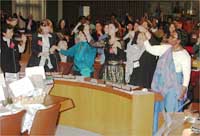
Above: The group of women living in conflict areas, at the UN. |
ITALY
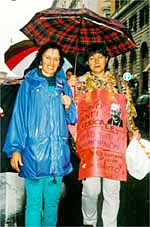
Above: The demonstration in Rome on September 30, 2000. |
Italian women were active in the struggle against the war in the former Yugoslavia and in Afghanistan, and against militarization fostered by neoliberal globalization. They insisted that these issues be included in the European common platform, which rejected all forms of extremism, fundamentalism and all measures imposed on women in the name of custom, tradition or religion.
|
|

|
Copyrights
:
CC by-nc-sa 2.0
Last modified
2006-03-23 03:09 PM
This item is available in
Français,
English,
Español
|
|








